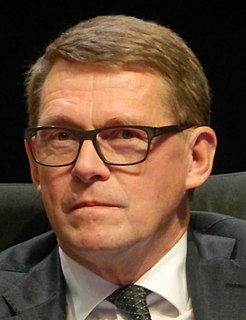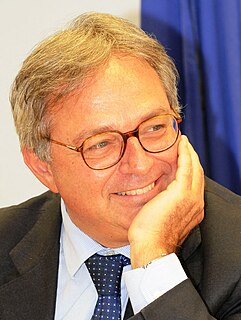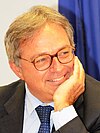
The European People's Party group is the political group in the European Parliament consisting of deputies (MEPs) from the member parties of the European People's Party (EPP), other unaffiliated national parties and independent deputies. In this respect, there is a distinction between the European People's Party itself and the EPP Group in the European Parliament, which is not limited to deputies that belong to EPP's member parties. The EPP mostly comprises politicians of Christian democratic, conservative and liberal-conservative orientation.

Fine Gael is a liberal-conservative political party in Ireland. Fine Gael is currently the governing and largest party in Ireland in terms of members of the Oireachtas and Irish members of European Parliament. The party has a membership of 21,000 and is the senior partner governing in a minority coalition with several independent politicians, with party leader Leo Varadkar serving as Taoiseach. Varadkar succeeded Enda Kenny as party leader on 2 June 2017 and as Taoiseach on 14 June; Kenny had been leader since 2002, and Taoiseach since 2011.

The Christian Democratic Union of Germany is a Christian-democratic, liberal-conservative political party in Germany. It is the major catch-all party of the centre-right in German politics. The CDU forms the CDU/CSU grouping, also known as the Union, in the Bundestag with its Bavarian counterpart the Christian Social Union in Bavaria (CSU). The party is widely considered an effective successor of the Centre Party, although it has a broader base.

The Christian Democratic Appeal is a Christian-democratic political party in the Netherlands. The CDA was originally formed in 1977 from a confederation of the Catholic People's Party, the Anti-Revolutionary Party and the Christian Historical Union, and has participated in all but three governments since then. Sybrand van Haersma Buma has been the Leader of the Christian Democratic Appeal since 18 May 2012.

The Moderate Party is a liberal-conservative political party in Sweden.
The party generally supports tax cuts, the free market, civil liberties and economic liberalism. Internationally, it is a full member of the International Democrat Union and European People's Party.

The Centre Party of Finland is a centrist, liberal, agrarian political party in Finland.

Matti Taneli Vanhanen is a Finnish politician who was Prime Minister of Finland from 2003 to 2010. He was also Chairman of the Centre Party, and in the second half of 2006 he was President of the European Council. In his earlier career he was a journalist. Vanhanen is the son of professor Tatu Vanhanen and Anni Tiihonen.

The Estonian Centre Party is a centrist, social-liberal, populist political party in Estonia. It is one of the two largest political parties in Estonia and currently has 26 seats in the Estonian Parliament. The Party is a member of the Alliance of Liberals and Democrats for Europe (ALDE).

The Union of the Centre, whose complete name is Union of Christian and Centre Democrats, is a Christian-democratic political party in Italy. Lorenzo Cesa is the party's current secretary; Pier Ferdinando Casini was for years the most recognisable figure and de facto leader of the party, before eventually distancing from it in 2016. The UdC is a member of the European People's Party (EPP) and the Centrist Democrat International (CDI), of which Casini was president from 2004 to 2015.
Liberal conservatism is a political ideology combining conservative policies with liberal stances, especially on economic, social and ethical issues, or a brand of political conservatism strongly influenced by liberalism.
An electoral swing analysis shows the extent of change in voter support, typically from one election to another, expressed as a positive or negative percentage. A multi-party swing is an indicator of a change in the electorate's preference between candidates or parties. A swing can be calculated for the electorate as a whole, for a given electoral district or for a particular demographic.

The Liberal Party is a social-liberal political party in Norway. The party is the oldest in Norway, and has enacted reforms such as parliamentarism, freedom of religion, universal suffrage and state schooling. For most of the late 19th and early 20th century, it was Norway's largest and dominant political party, but in the postwar era it lost most of its support and became a relatively small party. The party has nevertheless participated in several centrist and centre-right government coalitions in the postwar era. It currently holds eight seats in the Parliament, and is also a part of Norway's government together with the Conservative Party and the Progress Party. Since 2010, the leader of the party is Trine Skei Grande.
Centre-right politics or center-right politics, also referred to as moderate-right politics, are politics that lean to the right of the left–right political spectrum, but are closer to the centre than other right-wing politics. From the 1780s to the 1880s, there was a shift in the Western world of social class structure and the economy, moving away from the nobility and mercantilism, as well as moving towards the bourgeoisie and capitalism. This general economic shift towards capitalism affected centre-right movements such as the British Conservative Party, that responded by becoming supportive of capitalism.

Marit Arnstad is a Norwegian lawyer and politician for the Centre Party. She was the Norwegian Minister of Transport from 2012 to 2013.

The Green Alliance is a Colombian political party located in the centre of the political spectrum. The party advocates social justice, electoral reform and economic sustainability.

United Centre is a Ukrainian political party. It is an offspring of Our Ukraine. Legally United Centre is the successor of the Party of Private Property, registered with the Ministry of Justice on September 24, 1999. The party changed its name to United Centre in March 2008.

General elections were held in Sweden on 14 September 2014 to elect all 349 seats in the Riksdag, alongside elections for the 21 county councils, and 290 municipal assemblies.

The Social Democratic Party of Finland, shortened to the Social Democrats, is a social-democratic political party in Finland. The party is the largest party in the Finland's parliament with 40 seats. The party has set many fundamental policies of Finnish society during its representation in the Finnish Government. Founded in 1899, the SDP is Finland's oldest active political party. The SDP has a close relationship with Finland's largest trade union, SAK, and is a member of the Socialist International, the Party of European Socialists, and SAMAK.

In politics, centrism—the centre or the center —is a political outlook or specific position that involves acceptance or support of a balance of a degree of social equality and a degree of social hierarchy, while opposing political changes which would result in a significant shift of society strongly to either the left or the right.
Centre-left politics or center-left politics, also referred to as moderate-left politics, are political views that lean to the left-wing on the left–right political spectrum, but closer to the centre than other left-wing politics. Those on the centre-left believe in working within the established systems to improve social justice. The centre-left promotes a degree of social equality that it believes is achievable through promoting equal opportunity. The centre-left has promoted luck egalitarianism, which emphasizes the achievement of equality requires personal responsibility in areas in control by the individual person through their abilities and talents as well as social responsibility in areas outside control by the individual person in their abilities or talents.





















